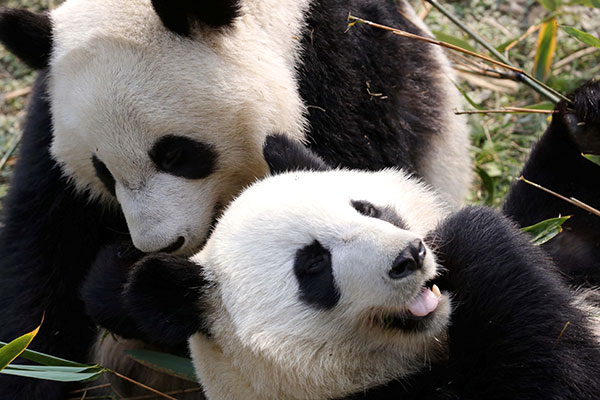
A pair of panda cubs, Mei Lun and Mei Huan, make their debut at the Chengdu Research Base of Giant Panda Breeding in Sichuan province on Dec 6 after they returned from the United States.[Photo by She Yi/China Daily]
Mei Lun hid in the bamboo forest, while her twin sister, Mei Huan, ignored human onlookers and ate bamboo slowly in the Chengdu Research Base of Giant Panda Breeding in Sichuan province on Dec 6, as they met visitors for the first time after a monthlong quarantine.
The pair of panda cubs, who returned to the base from the United States one month ago, have adapted to their new home, despite the elder sister’s shyness in the face of humans, researchers said.
“Mei Lun and Mei Huan are healthy. They ate a kind of biscuit made in Zoo Atlanta and now have buns the base makes specially for pandas,” Wu Kongju, a senior keeper and researcher, said at a news conference on Dec 6.
“Visitors can see them in their den in the Moon Nursery of the base,” she said.
Each day, Mei Huan, who has gained 2 kilograms since her return, takes in about 600 grams of buns made of corn, soybean and oatmeal. Mei Lun, who only ate US biscuits, can have some Chinese buns and many bamboo leaves.
The twins were returned to the base on Nov 5 from Zoo Atlanta in the US where they were born on July 15, 2013. They are the first surviving panda twins ever born in the US.
Their parents, Lun Lun and Yang Yang, were sent to Zoo Atlanta in 1999 under a breeding and research agreement between China and the US. According to the agreement, cubs born in the US must be returned to China.
Luo Yunhong, a young keeper, has taken care of Mei Lun and Mei Huan since the twin sisters arrived at the base early last month.
“They are amiable and never fight each other. Sometimes they hold each other when they sleep. They can be found eating bamboo with their backs leaning against each other,” he said.
All pandas returned from overseas are quarantined for a month.
While some pandas can adapt to the new environment on the first day of quarantine, others troubled by long hours of transportation are frightened and restless.
“A few frightened cubs even climb to the window in their den,” Wu said.
But researchers and keepers are experienced in helping the new arrivals.
“We can calm them down by giving them medicine and vitamins. All overseas returned pandas adapt to their new home when the monthlong quarantine is over,” Wu said.
